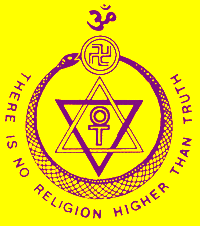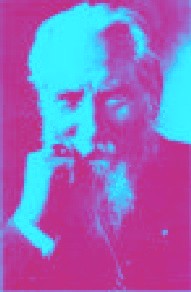A FREE INTRO TO THEOSOPHY

An Outline
of Theosophy
By
Charles
Webster Leadbeater

Reincarnation
Since the finer movements cannot at first affect the soul, he has to
draw round him vestures of grosser matter through which the heavier vibrations
can play; and so he takes upon himself successively the mental body, the astral
body, and the physical body. This is a birth or incarnation –the commencement
of a physical life. During that life all kinds of experiences come to him
through his
physical body, and from them he should learn some lessons and develop
some qualities in himself.
After a time he begins to withdraw into himself, and puts off by degrees
the vestures which he has assumed. The first of these to drop is the physical
body, and his withdrawal from that is what we call death. It is not the end of
his activities, as we so ignorantly suppose; nothing could be further from the
fact.
He is simply withdrawing from one effort, bearing back with him its
results; and after a certain period of comparative repose he will make another
effort of the same kind.
Thus, as has been said, what we ordinarily call his life is only one day
in the real and wider life – a day at school, during which he learns certain
lessons.
But inasmuch as one short life of seventy or eighty years at most is not
enough to give him an opportunity of learning all the lessons which this
wonderful and beautiful world has to teach, and inasmuch as God means him to
learn them all in His own good time, it is necessary that he should come back
again many times, and live through many of these schooldays that we call lives,
in different classes and under different circumstances, until all the lessons
are learned;
and then this lower schoolwork will be over, and he will pass to
something higher and more glorious – the true divine lifework for which all
this earthly
school-life is fitting him.
That is what is called the doctrine of reincarnation or rebirth – a
doctrine which was widely known in the ancient civilisations, and is even today
held by
the majority of the human race.
Of it Hume has written:-
“What is incorruptible must also be ungenerable. The soul, therefore, if
immortal, existed before our birth…..The metempsychosis is, therefore, the only
system of this kind that Philosophy can hearken to.” * (* Hume. “Essay on
Immortality,”
Writing of the theories of metempsychosis in
In his last and posthumous work this great Orientalist again refers to
this doctrine, and expresses his personal belief in it.
And Huxley writes: -
“Like the doctrine of evolution itself, that of transmigration has its
roots in the world of reality; and it may claim such support as the great
argument from analogy is capable of supplying.” ^ ( ^ Huxley, “Evolution and
Ethics,” p. 61, 1895.)
So it will be seen that modern as well as ancient writers recognise this
hypothesis as one deserving of the most serious consideration.
It must not for a moment be confounded with a theory held by the
ignorant, that it was possible for a soul which had reached humanity in its
evolution to re-become that of an animal. No such retrogression is within the
limits of possibility; when once man comes into existence – a human soul,
inhabiting what we call in our books a causal body – he can never again fall
back into what is in truth a lower kingdom of nature, whatever mistakes he may
make or however he may fail to take advantage of his opportunities. If he is
idle in the school of life, he may need to take the same lesson over and over
again before he has really learned it , but still on the whole progress is
steady, even though it may often be slow. A few years ago the essence of this
doctrine was prettily put
thus in one of the magazines: -
“A boy went to school. He was very little. All that he knew he had drawn
in with his mother’s milk. His teacher (who was God) placed him in the lowest
class, and gave him these lessons to learn: Thou shalt not kill. Thou shalt do
no hurt to
any living thing. Thou shalt not steal. So the man did not kill; but he
was cruel, and he stole, - At the end of the day (when his beard was grey –
when the
night was come) his teacher (who was God) said – Thou hast learned not
to kill. But the other lessons thou hast not learned. Come back tomorrow.”
“On the morrow he came back, a little boy, and his teacher (who was God)
put him in a class a little higher, and gave him these lessons to learn: Thou shalt do no hurt to any living thing.
Thou shalt not steal. Thou shalt not cheat. So the man did no hurt to any
living thing; but he stole and he cheated.
And at the end of the day – when his beard was grey – when the night was
come – his teacher
(who was god) said: Thou hast learned to be merciful. But the other
lessons thou hast not learned. Come back tomorrow.”
“Again, on the morrow, he came back, a little boy. And his teacher (who
was God) put him in a class yet a little higher, and gave these lessons to
learn: Thou shalt not steal. Thou shalt not cheat. Thou shalt not covet. So the
man did not steal; but he cheated, and he coveted. And at the end of the day –
(when his beard was grey –when night was
come) his teacher (who was God) said: Thou hast learned not to steal. But the other lessons thou hast not learned.
Come back, my child, tomorrow.”
“This is what I have read in the faces of men and women, in the book of
the world, and in the scroll of the heavens, which is writ in the stars.” (
Benson, in The Century Magazine, May 1894).
I must not fill my pages with the many unanswerable arguments in favour
of this
doctrine of reincarnation; they are set forth very fully in our literature
by a far abler pen than mine. Here I will say only this. Life presents us with
many problems which, on any other hypothesis than this of reincarnation, seem
utterly insoluble; this great truth does explain them, and therefore holds the
field until another more satisfactory hypothesis can be found. Like the rest of
the
teaching, this is not a
Hypothesis, but a matter of direct knowledge for many of us; but
naturally our knowledge is not proof to others.
Yet good men and true have been sorrowfully forced to admit that they
were unable to reconcile the state of affairs which exists in the world around
us with the theory that God was both almighty and all-loving. They felt, when
they looked upon all the heartbreaking sorrow and suffering, that either He was
not almighty, and could not prevent it, or He was not all-loving, and did not
care.
In Theosophy we hold with determined conviction that He is both almighty
and all-loving, and we reconcile with that certainty the existing facts of life
by means of this basic doctrine of reincarnation. Surely the only hypothesis
which
allows us reasonably to recognise the perfection of power and love in
the Deity is one which is worthy of careful examination.
For we understand that our present life is not our first, but that each
have behind us a long line of lives, by means of which we have evolved from the
condition of primitive man to our present position.
Assuredly in these past lives we shall have done both good and evil, and
from every one of our actions a definite proportion of result must have
followed under the inexorable law of justice. From the good follows always
happiness and further opportunity; from the evil follows always sorrow and
limitation.
So, if we find ourselves limited in any way, the limitation is of our
own making, or is merely due to the youth of the soul; if we have sorrow and
suffering to endure, we ourselves alone are responsible. The manifold
and complex destinies of men answer with rigid exactitude to the balance
between the good and evil of their previous actions; and all is moving onward
under the divine order towards the final consummation of glory.
There is perhaps, no Theosophical teaching to which more violent
objection is made than this great truth of reincarnation; yet it is in reality
a most comforting doctrine. For it gives us time for the progress which lies
before – time and opportunity to become “perfect”. Objectors chiefly found
their protest on the fact that they have had so much trouble and sorrow in this
life that they will not listen to any suggestion that it may be necessary to go
through it all again. But this is obviously not argument; we are in search of
truth, and when it is found we must not shrink from it, whether it be pleasant
or unpleasant, though, as a matter of fact, as said above, reincarnation
rightly understood is profoundly comforting.
Again, people often enquire why, if we have had so many previous lives,
we do not remember any of them. Put briefly, the answer to this is that some
people do remember them; and the reason why the majority do not is because
their consciousness is still focused in one or other of the lower sheaths.
That sheath cannot be expected to recollect previous incarnations,
because it has not had
any; and the soul, which has, is not yet fully conscious on its own
plane. But the memory of all the past is stored within the soul, and expresses
itself here in the innate qualities with which the child is born; and when the
man has evolved sufficiently to be able to focus his consciousness there
instead of only in lower vehicles the entire history of that real and wider
life will be open
before him like a book.
The whole of this question is fully and beautifully worked out in Mrs.
Besant’s manual on Reincarnation, Dr, Jerome Anderson’s Reincarnation and in
the chapters on that subject in The Ancient Wisdom, to which the attention of the reader is
specially directed.
For more info on Theosophy
Try these

Cardiff
Theosophical Society meetings are informal
and there’s always
a cup of tea afterwards
The Cardiff Theosophical Society Website
The National Wales Theosophy Website
Theosophy
Wales Youtube Channel
Ten Benefits of Studying the Blavatskyan
Theosophical Teachings
Studying
the Blavatskyan Theosophical teachings offers numerous benefits that can
greatly enrich one's understanding of spirituality, philosophy, and the nature
of reality. Theosophy, as defined by the
writings of Helena Petrovna Blavatsky, has had a profound impact on the
spiritual and philosophical landscape of the modern world. Blavatsky's teachings
draw from a wide range of religious and philosophical traditions, including
Hinduism, Buddhism, and Western esotericism, and present a comprehensive
worldview that addresses fundamental questions about existence, consciousness,
and the cosmos.
Here
are ten benefits of studying the Blavatskyan Theosophical Teachings
1.
Exploration of Esoteric Wisdom
One
of the primary benefits of studying the Blavatskyan Theosophical teachings is
the opportunity to explore esoteric wisdom that is often not readily accessible
in mainstream religious or philosophical traditions. Blavatsky's writings delve
into the esoteric teachings of ancient cultures and mystery schools, shedding
light on profound spiritual truths that have been passed down through the ages.
By delving into these esoteric teachings, students of Theosophy can gain
insights into the nature of consciousness, the structure of the cosmos, and the
evolution of the soul or immortal self.
2.
Synthesis of Eastern and Western Philosophy
Blavatsky's
Theosophical teachings synthesize elements of Eastern and Western philosophy,
offering a comprehensive framework that integrates concepts from diverse
cultural and religious traditions. This synthesis provides students with a
broader perspective on philosophical and spiritual thought, allowing them to
see the underlying unity of seemingly disparate belief systems. By studying
Theosophy, individuals can gain a deeper appreciation for the universal
principles that underlie all wisdom traditions, fostering a sense of unity and
interconnectedness with the world's spiritual heritage.
3.
Understanding of Universal Brotherhood
Central
to Blavatsky's Theosophical teachings is the principle of universal
brotherhood, which emphasizes the essential unity of all beings and the
interconnectedness of life. By studying Theosophy, individuals can develop a
profound understanding of the interconnected nature of existence, recognizing
that all living beings are fundamentally linked and that compassion and empathy
are essential for the evolution of humanity. This understanding can lead to a
greater sense of empathy, kindness, and social responsibility, fostering a more
harmonious and compassionate society.
4.
Insight into the Nature of Reality
The
Blavatskyan Theosophical teachings offer profound insights into the nature of
reality, consciousness, and the unseen dimensions of existence. Through the
study of Theosophy, individuals can explore concepts such as the
multi-dimensional nature of the universe, the existence of subtle energy realms,
and the interconnectedness of the material and spiritual planes. This
exploration can lead to a deeper understanding of the nature of reality beyond
the limitations of the physical senses, opening up new vistas of perception and
understanding.
5. Personal
Spiritual Growth
Studying
the Theosophical teachings can be a transformative journey that facilitates
personal spiritual growth and self-discovery. Blavatsky's writings offer
practical guidance for inner development, including meditation practices,
ethical principles, and the cultivation of spiritual virtues. By applying these
teachings to their lives, individuals can experience profound personal
transformation, leading to greater self-awareness, inner peace, and a sense of
purpose and meaning.
6. Ethical
and Moral Guidance
The
Theosophical teachings provide a comprehensive ethical and moral framework that
can guide individuals in their personal and social interactions. Blavatsky
emphasizes the importance of ethical conduct, altruism, and the pursuit of
wisdom, offering practical guidance for leading a virtuous and meaningful life.
By studying Theosophy, individuals can gain clarity on moral issues, cultivate
a sense of ethical responsibility, and contribute to the greater good of
humanity.
7.
Appreciation of Comparative Religion
The
study of Theosophy encourages an appreciation of comparative religion and the
underlying unity of religious and spiritual traditions. Blavatsky's writings
explore the common threads that run through the world's religions, highlighting
universal spiritual principles that transcend cultural and historical
boundaries. By gaining a deeper understanding of comparative religion through
Theosophy, individuals can develop a more inclusive and pluralistic
perspective, fostering interfaith harmony and mutual respect.
8.
Intellectual Stimulation
The
Theosophical teachings offer a rich and intellectually stimulating framework
for exploring profound philosophical and metaphysical concepts. Blavatsky's
writings encompass a wide range of subjects, including cosmology, metaphysics,
ancient wisdom, and the evolution of consciousness, providing ample material
for intellectual inquiry and contemplation. By engaging with these teachings,
individuals can expand their intellectual horizons, develop critical thinking
skills, and gain a deeper understanding of the fundamental questions that have
intrigued philosophers and mystics throughout history.
9.
Healing and Reconciliation
The
Theosophical teachings offer insights into the nature of healing and
reconciliation, both on a personal and collective level. Blavatsky's writings
delve into the esoteric principles of healing, the nature of disease, and the
interconnectedness of mind, body, and spirit. By studying Theosophy,
individuals can gain a deeper understanding of holistic healing modalities, the
power of the mind in influencing health, and the potential for spiritual
transformation through the healing process. Furthermore, the Theosophical
emphasis on universal brotherhood and compassion can contribute to the
reconciliation of divisions and conflicts within society, fostering a more
harmonious and peaceful world.
10.
Contribution to Global Transformation
Finally,
studying the Blavatskyan Theosophical teachings can empower individuals to
contribute to the ongoing global transformation towards a more enlightened and
compassionate world. Blavatsky's vision of a spiritually awakened humanity,
working towards the betterment of all beings, inspires individuals to engage in
positive action and service to humanity. By embodying the principles of
Theosophy in their lives, individuals can become agents of positive change,
working towards the realization of a more just, peaceful, and sustainable
world.
In
summary, the study of the Blavatskyan Theosophical teachings offers a wide
range of benefits, ranging from personal spiritual growth to the potential for
global transformation. By delving into the esoteric wisdom, ethical principles,
and philosophical insights of Theosophy, individuals can expand their understanding
of the nature of reality, cultivate compassion and empathy, and contribute to
the evolution of humanity towards a more harmonious and enlightened future. As
the Theosophical teachings continue to inspire and guide seekers of truth and
wisdom, their profound impact on individuals and society is likely to endure
for generations to come.
Dave’s Streetwise Theosophy Boards
This is for everybody not just people in Wales
Theosophy Cardiff’s Instant Guide to Theosophy
General pages about Wales, Welsh History
and The History of Theosophy in Wales
Teosofia en Cardiff (Página en Español)
One Liners & Quick Explanations
The Most Basic Theosophy Website in the Universe
If you run a Theosophy Study Group you can use
this as an introductory handout
The
South of Heaven Guide to
Theosophy and Devachan
The preparation of this Website
The Spiritual Home of Urban Theosophy
The Earth Base for Evolutionary Theosophy
Classic Introductory Theosophy Text
A Text Book of Theosophy By C
What Theosophy Is From the Absolute to Man
The Formation of a Solar System The Evolution of Life
The Constitution of Man After Death Reincarnation
The Purpose of Life The Planetary Chains
The Result of Theosophical Study
An Outstanding
Introduction to Theosophy
By a student of
Katherine Tingley
Elementary Theosophy Who is the Man? Body and Soul
Body, Soul and Spirit Reincarnation Karma
Preface to the American Edition Introduction
Occultism and its Adepts The Theosophical Society
First Occult Experiences Teachings of Occult Philosophy
Later Occult Phenomena Appendix
Newcastle Emlyn (Castell Newydd Emlyn) is on the
Cardiganshire Carmarthenshire border
Newcastle Emlyn (Castell Newydd Emlyn) is on the
Cardiganshire Carmarthenshire border
Preface
Theosophy and the Masters General Principles
The Earth Chain Body and Astral Body Kama – Desire
Manas Of Reincarnation Reincarnation Continued
Karma Kama Loka
Devachan
Cycles
Arguments Supporting Reincarnation
Differentiation Of Species Missing Links
Psychic Laws, Forces, and Phenomena
Psychic Phenomena and Spiritualism
Karma Fundamental Principles Laws: Natural and Man-Made The Law of Laws
The Eternal Now
Succession
Causation The Laws of Nature A Lesson of The Law
Karma Does Not Crush Apply This Law
Man in The Three Worlds Understand The Truth
Man and His Surroundings The Three Fates
The Pair of Triplets Thought, The Builder
Practical Meditation Will and Desire
The Mastery of Desire Two Other Points
The Third Thread Perfect Justice
Our Environment
Our Kith and Kin Our Nation
The Light for a Good Man Knowledge of Law The Opposing Schools
The More Modern View Self-Examination Out of the Past
Old Friendships
We Grow By Giving Collective Karma Family Karma
National Karma
India’s Karma
National Disasters
Wales Theosophy Links Summary
Hey Look! Theosophy in Cardiff
Try these if you are looking for a
local Theosophy Group or Centre
UK Listing of Theosophical Groups
Please tell us about your UK Theosophy Group
Worldwide Directory of Theosophical Links

General pages
about Wales, Welsh History
and The History
of Theosophy in Wales
Wales is a
Principality within the United Kingdom
and has an eastern
border with England. The land
area is just over
8,000 square miles. Snowdon in
North Wales is the
highest mountain at 3,650 feet.
The coastline is
almost 750 miles long. The population
of Wales as at the 2001 census is 2,946,200.
__________________________________________
into categories and presented according to relevance
of website.

